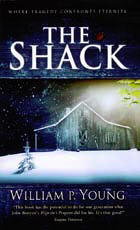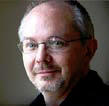Theology: Talking With Paul Young
The author of The Shack shares his thoughts about his best-selling novel.
I’m the most accidental author you’ll ever meet. I’ve never published anything before.
I didn’t intend to write a great book on the Trinity. I wanted to communicate to my children the fact that the very nature of relationship has to be embedded in the character and nature of God.
I think that for a lot of us who grew up inside religious kinds of environments, The
Shack allows God to become accessible and understandable in a way that hasn’t been out there in the same kind of form.
A lot of us grew up with an idea that everything was based on our performance. And so instead of a new covenant understanding of union with Christ, we still function as if we lived in the old covenant, separated from God. And we think that separation is our problem. It’s our fault and it’s our sin. And now it is up to us through behavior to get across that separation to wherever God is — to enter his holiness.
The “shack” is a metaphor. It’s the place where we got hurt. It’s the place where we got damaged, and we don’t want to go back there. |  |
The “shack” is a metaphor. It’s the place where we got hurt. It’s the place where we got damaged, and we don’t want to go back there. We want God to come in and just yank us from where we are, to somewhere where we think we ought to be. And he says, “No, we’re going to actually begin to heal the emotions, and heal the thinking, and heal the heart, and do all these things. But to do that, we’ve got to go back there. For me, it took 38 years to get to the shack; it took 11 years to get through the shack. I condense that 11 years to a weekend for Mackenzie
Allen Phillips, the main character.
So, the characterization of God in the book is just an attempt, in fiction, to try to describe that solidity of character [of God] that I think a lot of us have not trusted.
“But I always liked Jesus better than you. He seemed so gracious and you seemed so…”
“Mean? Sad, isn’t it? He came to show people who I am and most folks only believe it about him. They still play us off like good cop/bad cop most of the time, especially the religious folk. When they want people to do what they think is right, they need a stern God. When they need forgiveness, they run to Jesus” The Shack, p. 186).
What’s the main question in legalism? It’s “How much is enough?” And the answer is always, “More.” How much is enough prayer? How much is enough reading Scripture? How much is enough giving? How much is enough? And legalism says, “More.”
We have the idea of a still angry God, who has calmed down, but you can never be sure when his anger will break loose again. So we fall back on performance, thinking that our behavior is the basis for his mood. We have to maintain at least an adequate amount of behavior so that he feels good about himself and doesn’t take it out on us.
In the book, Jesus says,
“Remember, the people who know me are the ones who are free to live and love without any agenda.”
And Mack says, “Is that what it means to be a Christian?”…
“Who said anything about being a Christian? I’m not a Christian,” Jesus said.
“The idea struck Mack as odd and unexpected…. ‘No, I suppose you aren’t.’”
And then Jesus says, “Those who love me come from every system that exists. They were Buddhist or Mormons, Baptists or Muslims, Democrats, Republicans and many who don’t vote or are not part of any Sunday morning or religious institutions. I have followers who were murderers and many who were self-righteous. Some are bankers and bookies, Americans and Iraqis, Jews and
Palestinians. I have no desire to make them Christian, but I do want to join them in their transformation into sons and daughters of my Papa, into my brothers and sisters, into my Beloved.”“‘Does that mean,’ asked Mack, ‘that all roads will lead to you?”
“‘Not at all,’ smiled Jesus…. ‘Most roads don’t lead anywhere. What it does mean is that I will travel any road to find you’” (The Shack, pp. 181-182).
When somebody asks me if I’m a Christian, I’ll say, “Would you please tell me what one is, and I’ll tell you if I’m one of those.” If we’re on the same page, I don’t have any problem identifying myself as a Christian. But I want some agreement about what we are talking about. I don’t want to be identified with what some people think is a Christian.
What’s the main question in legalism? It’s “How much is enough?” And the answer is always, “More.” How much is enough prayer? How much is enough reading Scripture? How much is enough giving? How much is enough? And legalism says, “More.” |  |
There are folks who are saying, “There’s just not enough wrath in this book,” because there’s wrath in Scripture. Of course, there is. To me the wrath of God is God’s very character against everything that is wrong. The fact that a doctor wants to perform surgery to cut a piece of your body out because it’s got cancer doesn’t mean that he hates you. In fact, he’s after that which is destroying you. And when you look in his face and you see that anger, you might misunderstand that he is making a value statement about you. But he’s not. He is coming after everything that keeps us from being free and being whole.
“Mack allowed his oar to turn in his hands as he let it play in the water’s movements. ‘It feels like living out of relationship — you know, trusting and talking to you — is a bit more complicated than just following rules.’
“‘What rules are those, Mackenzie?”
“‘You know, all the things the Scriptures tell us we should do.”
“‘Okay…,’ she said with some hesitation. ‘And what might those be?’
“‘You know,’ he answered sarcastically. ‘About doing good things and avoiding evil, being kind to the poor, reading your Bible, praying, and going to church. Things like that.’
“‘I see. And how is that working for you?’
“He laughed. ‘Well, I’ve never done it very well. I have moments that aren’t too bad, but there’s always something I’m struggling with, or feeling guilty about. I just figured I needed to try harder, but I find it difficult to sustain that motivation.”
“‘Mackenzie!” she chided, her words flowing with affection. ‘The Bible doesn’t teach you to follow rules. It is a picture of Jesus. While words may tell you what God is like and even what he may want from you, you cannot do any of it on your own. Life and living is
in him and in no other. My goodness, you didn’t think you could live the righteousness of God on your own, did you?’“‘Well, I thought so, sorta…” he said sheepishly’ (The Shack, pp. 197-198)
If we see it [the Bible] as behavioral without the illumination of the Spirit, those words are dead to us. They don’t produce life. We are absolutely dependent, even in the words of Scripture, for the presence and life and illumination of the power of the Holy Spirit. All of us are. We all know folks who know the words very well but have no life in them. Remember that incident where Jesus met some disciples on the Emmaus Road? Starting with Moses, he showed them himself throughout all of Scripture. It’s a story; it’s a story of his love for us.
I love Scripture, you know. But I’m not at all convinced that Scripture is the sole and
only place through which God speaks. In my life, it’s been through movies, music, creation, relationships, conversation, art, architecture. The Spirit is very able to speak through whatever the Spirit has available, or what we’ve given the Spirit to be available.
We don’t have any guarantees we’ll be here tomorrow. So I want to spend this day in the
present, in the presence of the one who loves me best. I don’t want to project it into what’s going to happen into the future and be freaked out. This is where he lives with me, and it goes back to the prayer I prayed at the beginning of 2005, when I came out of the shack: “I will never ask you again, Papa, I’ll never ask you again to bless anything that I do, but if you have something that you’re blessing that I could hang around, I would love that.”
We live our lives, and that happens today. Today is the day of salvation. Today, enter
my rest, today. This is where eternity intersects my life — today.
These comments are excerpted from three interviews with Paul Young for the You’re Included program. To see the complete interviews or read full transcripts, go to https://archive.gci.org/category/people/william-p-young.
